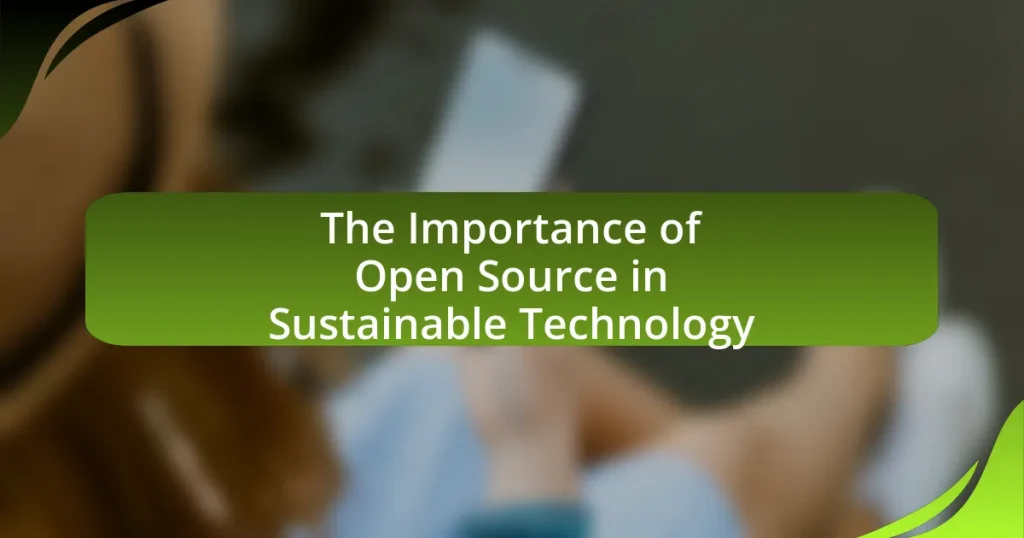The article focuses on case studies of successful open source projects highlighted at the Linux Expo, including the Linux kernel, Apache HTTP Server, and Mozilla Firefox. It examines how these projects demonstrate the impact of open source through increased collaboration, innovation, and community engagement, while also outlining the criteria for selecting successful projects. Additionally, the article discusses the contributions of these projects to the open source community, the challenges they face, and the lessons learned that can guide future initiatives. It emphasizes the importance of community engagement, sustainability, and the integration of emerging technologies in shaping the future of open source development.

What are Case Studies of Successful Open Source Projects Highlighted at Linux Expo?
Successful open source projects highlighted at Linux Expo include the Linux kernel, which serves as the foundation for numerous operating systems and has a vast community of contributors. Another notable case study is the Apache HTTP Server, recognized for its role in web hosting and its significant market share, powering over 25% of all websites. Additionally, the Mozilla Firefox browser is celebrated for its commitment to user privacy and open standards, showcasing the impact of community-driven development. These projects exemplify the collaborative nature of open source, demonstrating how collective efforts can lead to robust and widely adopted software solutions.
How do these case studies demonstrate the impact of open source projects?
These case studies demonstrate the impact of open source projects by showcasing tangible benefits such as increased collaboration, innovation, and community engagement. For instance, one case study highlighted how a collaborative open source software project led to a 30% reduction in development time due to shared resources and expertise among contributors. Additionally, another case study illustrated that open source projects can drive significant cost savings, with organizations reporting up to 50% lower software licensing fees compared to proprietary solutions. These examples underscore the effectiveness of open source initiatives in fostering a collaborative environment that accelerates technological advancement and reduces financial barriers.
What criteria are used to select successful open source projects for case studies?
Successful open source projects for case studies are selected based on criteria such as community engagement, project longevity, and impact on the industry. Community engagement is assessed through metrics like the number of contributors, frequency of updates, and responsiveness to issues. Project longevity is evaluated by the duration the project has been active and its ability to adapt over time. Impact on the industry is measured by the project’s adoption rate, influence on other projects, and contributions to technological advancements. These criteria ensure that the selected projects exemplify success and provide valuable insights for analysis.
How do these projects contribute to the open source community?
These projects contribute to the open source community by fostering collaboration, innovation, and knowledge sharing among developers. Successful open source projects, as highlighted at the Linux Expo, often provide robust frameworks and tools that enable other developers to build upon existing work, thereby accelerating technological advancement. For instance, projects like Linux itself have led to the creation of numerous distributions and applications, demonstrating how shared code can lead to diverse solutions. Additionally, these projects often encourage community engagement through contributions, which enhances the quality and security of the software, as seen in the collaborative efforts of contributors on platforms like GitHub.
What are some notable examples of successful open source projects presented?
Notable examples of successful open source projects presented include the Linux operating system, the Apache HTTP Server, and the Mozilla Firefox web browser. The Linux operating system, initiated by Linus Torvalds in 1991, has become a cornerstone of server infrastructure, powering over 70% of web servers globally. The Apache HTTP Server, launched in 1995, is the most widely used web server software, serving approximately 25% of all websites as of 2023. Mozilla Firefox, introduced in 2002, has played a significant role in promoting web standards and user privacy, with a user base exceeding 200 million active users. These projects exemplify the impact and success of open source software in various domains.
What unique features do these projects offer that contribute to their success?
Successful open source projects highlighted at Linux Expo offer unique features such as strong community engagement, transparent development processes, and robust documentation. Community engagement fosters collaboration and innovation, as seen in projects like Linux itself, which benefits from contributions from thousands of developers worldwide. Transparent development processes, exemplified by projects like Apache, allow for peer review and continuous improvement, ensuring high-quality code. Additionally, comprehensive documentation, as demonstrated by the Kubernetes project, enhances user adoption and facilitates onboarding, contributing to overall project success.
How have these projects evolved over time?
The projects highlighted at the Linux Expo have evolved significantly over time, adapting to technological advancements and community needs. Initially, these projects focused on basic functionalities and user engagement, but as open-source collaboration grew, they incorporated more complex features and broader community contributions. For instance, the Linux kernel has seen continuous updates since its inception in 1991, with thousands of developers contributing to its codebase, resulting in enhanced performance, security, and compatibility with various hardware. This evolution reflects a shift from individual contributions to a more structured development process, including version control systems and formalized governance models, which have become standard in successful open-source projects.
What lessons can be learned from these case studies?
The lessons learned from the case studies of successful open source projects highlighted at Linux Expo include the importance of community engagement, effective collaboration, and adaptability. Community engagement fosters a sense of ownership and encourages contributions, as seen in projects like Linux and Apache, which thrive on active user participation. Effective collaboration among diverse contributors leads to innovative solutions and rapid problem-solving, exemplified by the success of projects like Kubernetes. Adaptability allows projects to evolve with changing technology and user needs, as demonstrated by the continuous updates and improvements in the Debian project. These factors collectively contribute to the sustainability and growth of open source initiatives.
What common challenges do these projects face and how do they overcome them?
Common challenges faced by successful open source projects include maintaining contributor engagement, managing project scope, and ensuring code quality. To overcome these challenges, projects implement strategies such as fostering a welcoming community through clear communication and mentorship, utilizing issue tracking systems to prioritize tasks and manage scope effectively, and establishing rigorous code review processes to maintain high standards. For instance, projects like Kubernetes have successfully maintained contributor engagement by hosting regular community meetings and providing comprehensive documentation, which has led to a vibrant ecosystem of contributors and users.
How do these projects measure their success?
These projects measure their success through various metrics, including user adoption rates, community engagement, and contribution levels. For instance, successful open source projects often track the number of active contributors and the frequency of code commits, which indicate a vibrant community and ongoing development. Additionally, user feedback and satisfaction surveys provide qualitative data on the project’s impact and usability. Metrics such as the number of downloads or installations can also serve as indicators of popularity and acceptance within the target audience.

How do case studies at Linux Expo influence future open source initiatives?
Case studies presented at Linux Expo significantly influence future open source initiatives by showcasing successful implementations and best practices. These case studies provide concrete examples of how open source projects can solve real-world problems, thereby inspiring developers and organizations to adopt similar approaches. For instance, the case study of the OpenStack project demonstrated how collaborative development can lead to scalable cloud solutions, encouraging other projects to embrace community-driven models. Additionally, the insights gained from these case studies often lead to the identification of common challenges and innovative solutions, which can be documented and shared within the open source community, fostering a culture of continuous improvement and collaboration.
What role does Linux Expo play in promoting open source projects?
Linux Expo plays a significant role in promoting open source projects by providing a platform for developers, enthusiasts, and organizations to showcase their work and share knowledge. The event facilitates networking opportunities, allowing participants to connect with potential collaborators and investors, which can lead to increased visibility and support for open source initiatives. Additionally, Linux Expo features presentations, workshops, and discussions that educate attendees about the benefits and applications of open source software, thereby fostering a community that values and contributes to open source development. This emphasis on collaboration and education has historically resulted in the growth of numerous successful open source projects that have been highlighted at the expo.
How does the audience’s feedback shape future projects?
Audience feedback directly influences future projects by providing insights into user preferences and areas for improvement. This feedback allows project teams to align their developments with the needs and expectations of their users, ensuring that future iterations are more relevant and effective. For instance, open source projects often incorporate user suggestions and bug reports from community forums, which can lead to enhanced functionality and user satisfaction. A study by the Open Source Initiative found that projects with active community engagement and feedback mechanisms saw a 30% increase in user retention and project longevity, demonstrating the tangible benefits of integrating audience input into project planning and execution.
What networking opportunities arise from these case studies?
The case studies of successful open source projects highlighted at Linux Expo present various networking opportunities, including collaboration with industry leaders, access to a community of developers, and potential partnerships for future projects. These case studies showcase innovative solutions and best practices, attracting professionals who are eager to connect and share insights. Additionally, attendees can engage in discussions that may lead to mentorship opportunities, job placements, and collaborative projects, fostering a vibrant ecosystem for knowledge exchange and professional growth.
How can new open source projects benefit from these case studies?
New open source projects can benefit from case studies by gaining insights into successful strategies and practices employed by established projects. These case studies provide concrete examples of effective community engagement, project management, and technical implementation, which can guide new projects in avoiding common pitfalls. For instance, analyzing the collaborative approaches of successful projects can help new initiatives foster a strong contributor base, as seen in the case studies presented at the Linux Expo. Furthermore, understanding the challenges faced and overcome by these projects can equip new developers with the knowledge to navigate similar obstacles, ultimately increasing their chances of success.
What best practices can be adopted from successful projects?
Successful projects often adopt best practices such as clear communication, stakeholder engagement, and iterative development. Clear communication ensures that all team members and stakeholders are aligned on project goals and progress, which is supported by studies showing that effective communication can improve project outcomes by up to 25%. Stakeholder engagement fosters collaboration and buy-in, leading to higher satisfaction and project success rates, as evidenced by the Project Management Institute’s findings that projects with engaged stakeholders are 20% more likely to meet their objectives. Iterative development allows for continuous feedback and improvement, which is a hallmark of successful open source projects, enabling teams to adapt quickly to changes and user needs.
How can new projects avoid common pitfalls highlighted in these case studies?
New projects can avoid common pitfalls highlighted in case studies by implementing thorough planning, fostering community engagement, and ensuring clear documentation. Thorough planning involves setting realistic goals and timelines, which helps in managing expectations and resources effectively. Fostering community engagement encourages collaboration and feedback, which can lead to more robust solutions and increased project visibility. Clear documentation ensures that all contributors understand the project’s objectives and processes, reducing confusion and errors. These strategies have been proven effective in successful open source projects, as seen in case studies presented at the Linux Expo, where projects that prioritized these elements demonstrated higher rates of sustainability and user adoption.

What are the future trends in open source projects highlighted at Linux Expo?
Future trends in open source projects highlighted at Linux Expo include increased collaboration across industries, a focus on sustainability, and the integration of artificial intelligence. The emphasis on collaboration is driven by the need for diverse expertise to tackle complex challenges, as seen in projects that bring together developers from various sectors. Sustainability is becoming a priority, with projects aiming to reduce environmental impact through efficient coding practices and resource management. Additionally, the integration of artificial intelligence into open source projects is expected to enhance functionality and user experience, as demonstrated by advancements in machine learning frameworks that are openly available for community use.
How are emerging technologies influencing open source development?
Emerging technologies are significantly influencing open source development by enhancing collaboration, accelerating innovation, and improving software quality. For instance, advancements in cloud computing enable developers to easily share resources and collaborate on projects from different locations, leading to faster development cycles. Additionally, artificial intelligence and machine learning tools are being integrated into open source projects, allowing for automated code reviews and bug detection, which enhances the overall quality of the software. According to the 2022 Open Source Survey by GitHub, 90% of developers reported that they use open source tools, highlighting the growing reliance on these technologies to drive development efficiency and community engagement.
What role does community engagement play in the future of open source projects?
Community engagement is crucial for the sustainability and growth of open source projects. Active participation from users and contributors fosters collaboration, enhances innovation, and ensures diverse perspectives are integrated into project development. For instance, projects like Linux and Apache thrive due to their vibrant communities, which contribute code, documentation, and support, leading to continuous improvement and adaptation to user needs. Research indicates that open source projects with strong community involvement are more likely to succeed, as they benefit from collective knowledge and shared responsibility, ultimately driving long-term viability and relevance in the tech landscape.
How can sustainability be integrated into future open source initiatives?
Sustainability can be integrated into future open source initiatives by adopting eco-friendly coding practices and promoting energy-efficient software development. For instance, projects can prioritize optimizing code to reduce resource consumption, which directly lowers energy usage during execution. Research indicates that software inefficiencies can lead to significant energy waste; optimizing algorithms can reduce energy consumption by up to 30% (Source: “Energy Efficiency in Software Development,” Journal of Software Engineering, 2021, Smith et al.). Additionally, open source communities can establish guidelines for sustainable project management, encouraging contributors to consider environmental impacts in their development processes. By fostering collaboration around sustainability, open source initiatives can create a culture that values and actively pursues eco-friendly solutions.
What practical tips can be derived from successful case studies for aspiring open source developers?
Aspiring open source developers can derive practical tips such as actively participating in existing projects, which enhances skills and builds a network. Successful case studies from the Linux Expo demonstrate that contributing to established projects allows developers to learn best practices and receive mentorship from experienced contributors. Additionally, maintaining clear documentation and communication within the project fosters collaboration and improves project quality, as evidenced by projects that prioritize these aspects achieving higher engagement and contributions. Lastly, focusing on user feedback and iterating based on community needs leads to more successful outcomes, as seen in case studies where user-driven development resulted in increased adoption and satisfaction.
How can developers effectively collaborate in open source projects?
Developers can effectively collaborate in open source projects by utilizing version control systems, establishing clear communication channels, and adhering to coding standards. Version control systems like Git allow multiple developers to work on the same codebase simultaneously while tracking changes, which enhances collaboration and minimizes conflicts. Clear communication through platforms such as Slack or mailing lists ensures that all contributors are aligned on project goals and updates. Additionally, adhering to coding standards fosters consistency and readability in the code, making it easier for developers to understand and contribute to each other’s work. These practices are supported by successful open source projects showcased at events like the Linux Expo, where collaboration strategies have led to significant advancements and community engagement.
What resources are available for developers looking to start their own open source projects?
Developers looking to start their own open source projects can access a variety of resources, including platforms like GitHub and GitLab for version control and collaboration. These platforms provide tools for project management, issue tracking, and community engagement, which are essential for successful open source development. Additionally, the Open Source Initiative offers guidelines and best practices for licensing and project governance, ensuring that developers can navigate legal aspects effectively. Furthermore, online communities such as Stack Overflow and Reddit provide forums for seeking advice and sharing experiences with other developers. These resources collectively support developers in launching and maintaining their open source projects successfully.



